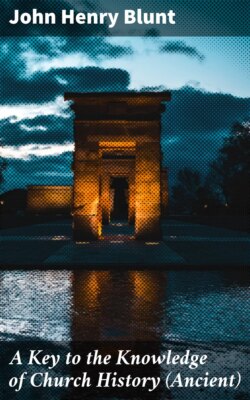Читать книгу A Key to the Knowledge of Church History (Ancient) - John Henry Blunt - Страница 21
На сайте Литреса книга снята с продажи.
Section 3. The Apostolic Church in Antioch.
ОглавлениеTable of Contents
A.D. 42. St. Barnabas at Antioch.
We have no account in the Book of Acts of the Foundation (in the strict sense of the word) of the Church in Antioch. We read of St. Barnabas being sent thither from Jerusalem to visit and teach the converts amongst the Greek-speaking Jews, he being all the more fitted for this office by his connexion with Cyprus, whence came some of those who had first spread the knowledge of the Gospel in Antioch. But St. Barnabas was not yet of the number of the Apostles, the Foundations of the Church (as neither was St. Paul, whom he lovingly sought out and brought from Tarsus to aid in his work); and consequently we do not read that the "laying on of hands" formed any part of their ministrations. St. Peter believed to be the founder of the Church in Antioch. There is, however, a very ancient tradition which tells us that St. Peter visited Antioch and founded the Church in that distant city whilst on his way to the still more distant Rome, after his miraculous escape from Herod's prison (A.D. 44); and in the ancient Church of England Feb. 22 was observed in commemoration of "St. Peter's Throne at Antioch," that is, of his episcopal rule there.
Obstacles to the conversion of the gentiles.
It was some years before the conversion of Cornelius and his gentile household was followed by any extended proclamation of the good tidings of the Gospel to the heathen world. It was not God's Will that all obstacles should be at once cleared away from the onward path of the Church; and the question of the relation in which the heathen were to stand to the Law of Moses after their conversion to Christianity, presented many difficulties. St. Peter and the other Apostles seem to have waited patiently until God should vouchsafe to show them how these difficulties might best be overcome; and on the Church in the large gentile city of Antioch it first devolved to send forth missionaries to the heathen.
[1] St. Matt. xvi. 16–19.
[2] Acts x. 48. It does not seem to have been the usual custom of the Apostles to administer Holy Baptism themselves. See 1 Cor. i. 14–17.
[3] In reference to the martyrdom of St. James, we may remember the prophecy of his Divine Master (St. Matt. xx. 23). "James tasted the first draught of Christ's cup of suffering; and his brother John had the longest draught of it."—Wordsworth on Acts xii. 2.
